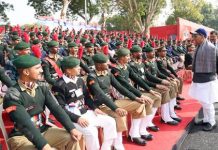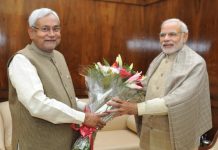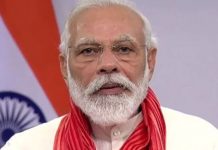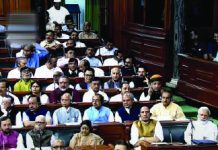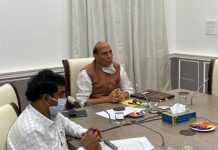A Tehelka SIT report exposes a widespread racket involved in the illicit business of counterfeit currency, whose demand sees a surge during the election season
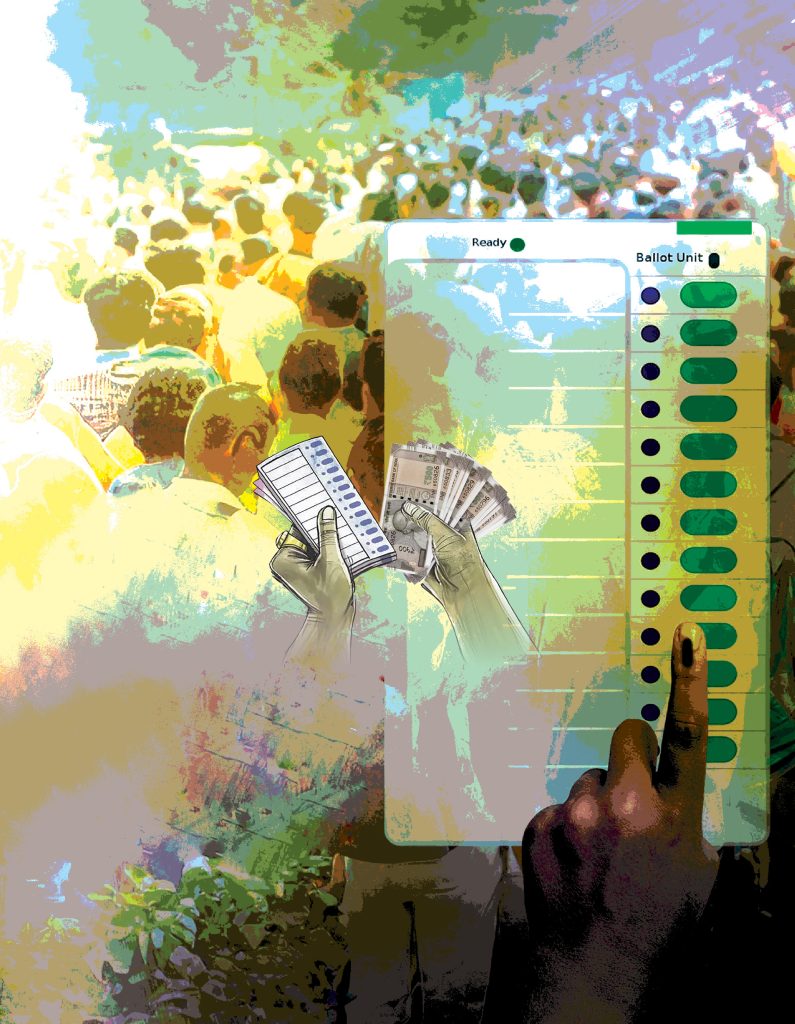
“I don’t want to be arrested because there is no one who would get me out on bail. I know there is nobody who would care for me while I am in jail. I apprehend that some people who know about my involvement in the fake currency business could get me arrested. So, please ensure that I don’t end up behind bars.”
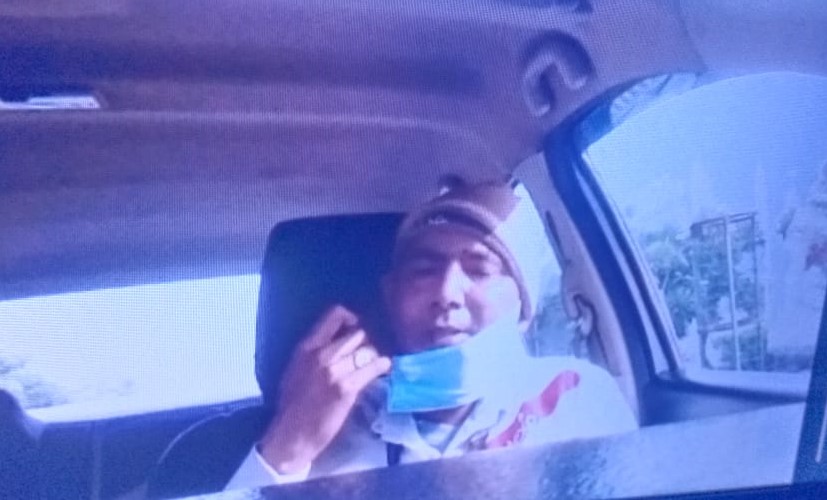
Meet Sameer (he goes by his first name only), a barber by profession, who lives in Mangalore, Karnataka. In a candid phone conversation with the Tehelka reporter, Sameer revealed details about his illicit fake currency business. According to Sameer, he can connect us with a contact in Noida, Uttar Pradesh, who specializes in producing counterfeit currency “for election purposes.” All we need to do is provide an advance payment of Rs 50,000. Once the transaction is complete, the contact will procure a note-printing material and deliver fake currency worth double the value of the cash received within a couple of days. Sameer assured us that any additional currency requirements would also be met by his contact in Noida.
To expose this intricate fake currency network, our reporter posed as a client serving fictitious candidates contesting the general elections. Sameer informed our reporter that there was no need to travel to Mangalore; and he would arrange everything in Noida itself.
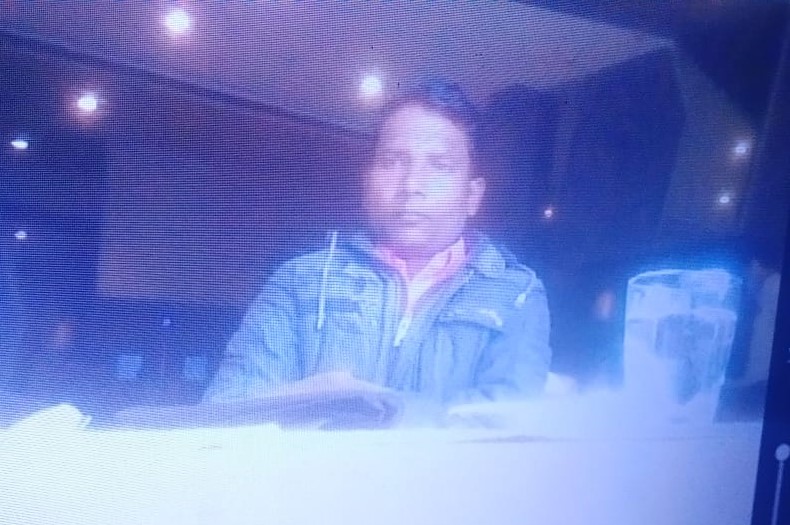
As the elections unfold, counterfeit currency remains a worst kept secret. It is believed that millions of fake notes flood the system during election season. Recently, the Gaya district police in Bihar apprehended a gang involved in printing counterfeit currency specifically for the 2024 elections. The Cherki police station seized fake notes with a total face value of Rs 4.73 lakh, along with the printing machine used for fabricating the fake currency. Counterfeit notes of Rs 500, 200, 100, and 50 were among the fake currency recovered. Authorities suspect that these fake notes were intended to be used during the Lok Sabha elections, which are drawing to close.
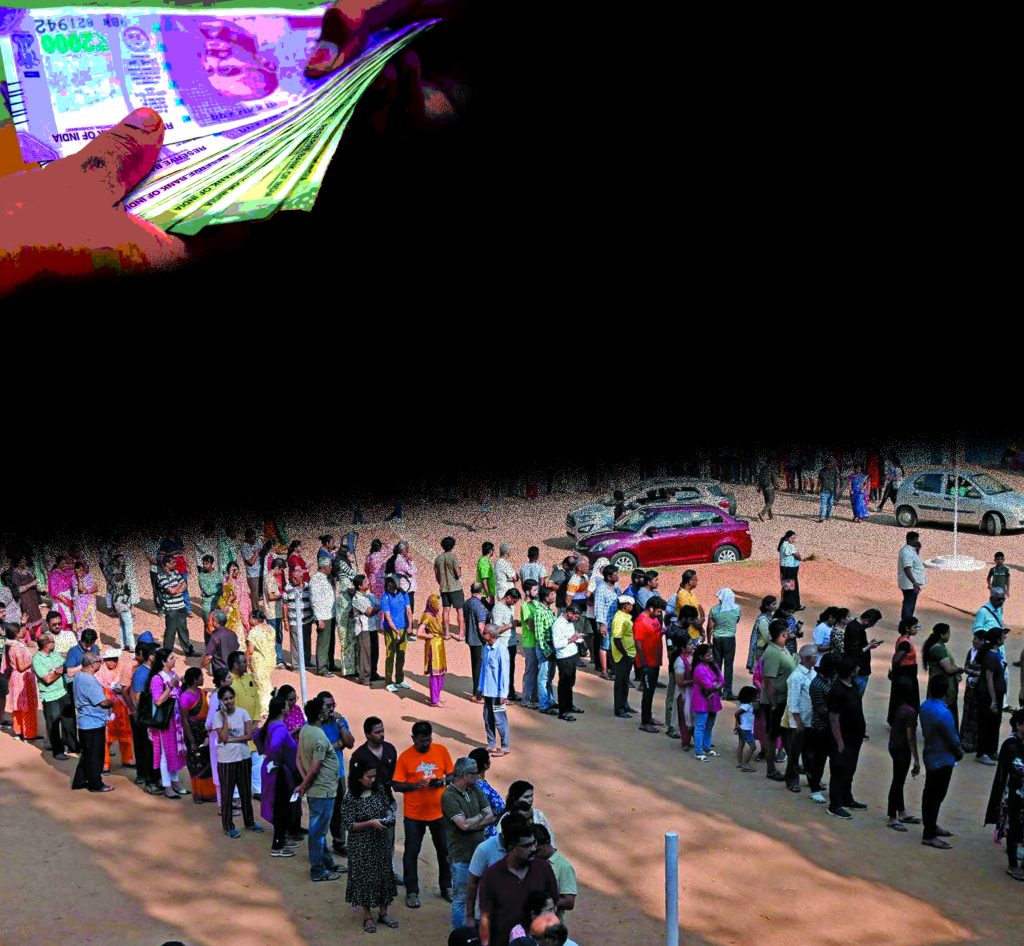
In the month of May this year, following the announcement of the general elections, the Motihari police in Bihar once again apprehended two individuals involved in the illicit fake currency trade. The police seized Rs 13 lakh worth of counterfeit currency intended to be used in the 2024 general elections. Meanwhile, in another incident in Jhansi, Uttar Pradesh, the police arrested four people in possession of fake currency amounting to Rs 2.50 lakh, along with a note printing machine. Additionally, in April, after the poll dates were announced, the Hyderabad Police busted a gang engaged in production and circulation of counterfeit Indian currency notes. Six people were arrested during the operation, and the police confiscated fake currency notes worth Rs 36.35 lakh, along with a net cash amount of Rs 28,000. The printing materials used in the fabrication process were also recovered from the gang.
During any election season in India, news reports about seized fake currency flood media outlets. Those involved in the fake currency business become active as soon as the election fervor sets in. And the current elections are no exception. This investigation by Tehelka into counterfeit currency has exposed a widespread racket. Consider the cash in your wallet—could it be fake currency? It’s possible. Some of these counterfeit notes are manufactured in Pakistan and routed through Bangladesh.
Despite demonetization, which aimed to eliminate fake currency from the system, the circulation of counterfeit notes continues to be a headache for the government. Even during the 2019 general elections, there were reports of fake currency being used.
This time, as the 2024 election process kicked off, we, during our investigation, stumbled upon individuals in the Hindi heartland who specialize in producing fake currency notes. Not only that, these individuals openly admitted their involvement in creating counterfeit money during almost every Indian election in the past too. They even claimed to have also supplied fake currency to the general public for day-to-day transactions.
During the investigation, we first spoke with Rohit Sharma, a seasoned player in the fake currency trade. Upon meeting him, Rohit Sharma promptly disclosed his rate for counterfeit currency. According to his terms, we would need to provide him with Rs 1 lakh to receive Rs 3 lakh worth of counterfeit notes.
Rohit … “Ek ka teen milta hai”.
Reporter…. “Main apko ek lakh dunga…ek ka teen matlab?.
Rohit…. “Teen lakh rupay dunga main apko”.
Reporter…. “Main ek lakh dunga….Aap mujhey naqli note ke teen lakh dogey?”
Rohit…. “Haan”.
[In the conversation, Rohit reveals that for every Rs 1 lakh given to him, he will provide counterfeit notes with total face value of Rs 3 lakh. This uncovers the exchange rate and confirms Rohit’s involvement in the fake currency business.]
Rohit Sharma confessed that during elections, the demand for fake currency rises significantly, and he receives numerous orders for counterfeit notes. He noted that representatives and associates of MPs and MLAs frequently seek his services during this time.
Reporter…. “Abhi tumhara chunaav mein to kaam badh gaya hoga. Kitna badh gaya?”
Rohit…. “Abhi chalu honey wala hain. Dheerey-dheerey badh raha hai. Badega thoda-thoda. Election main to kaam aata hai”
Reporter… “Zyada aata hai”.
Rohit…. “Hmm”.
Reporter…. “Kaun log aatey hain zyada chunav main?”
Rohit…. “Sansad, vidhayak ke kaam aatey hain hamarey paas.”
Reporter…. “Vidhayak, Sansad khud aatey hai….ya unkey log aatey hain?”
Rohit…. “Log aatey hain unke”.
[Rohit Sharma revealed that demand for fake currency increases during elections and he starts getting more and more work orders. The conversation reveals the scale and key clients of his illicit operations.]
Now, Rohit Sharma revealed the maximum number of fake notes he had supplied in a single day. He admitted to distributing up to 10 lakh rupees worth of counterfeit currency in just 24 hours. When probed further, Rohit confessed that his fake currency network spans across the entire country, and is capable of reaching any region in India.
Reporter… “Sabse zyada maal aapne ek din main kitna maal aapne supply kiya hai?”
Rohit… “10 lakh rupay ek din mein”.
Reporter…. “Karein hain?”
Rohit…. “Haan”.
Reporter…. “Desh main kahan-kahan supply kar sakte ho?”
Rohit…. “Hamara desh hain bahut bada network hai, kahin bhi kar sakte hai”.
Reporter…. “Kahin bhi kar sakte ho?”
Rohit…. “Haan”.
Reporter…. “Kashmir-South”.
Rohit…. “ Haan, note to yehi hai koi Hongkong ka note to hai nahin”.
Reporter…. “Hongkong kya?”
Rohit… “Hongkong desh ka hai nahin hamarey paas”.
[Rohit’s assertion that his counterfeit currency distribution network spans across India highlights the extensive reach and high volume of his operations.]
Rohit assured us that his fake currency worked seamlessly across India, with the exception of banks. He confidently claimed that his counterfeit notes could circulate undetected throughout the country.
Reporter…. “Matlab koi pakad na paye jo naqli note de rahe aap hamein?”
Rohit…. “Hamara kaam pakka hai. Kaan pakad lena hamara. Market mein kahin bhi ghoom lena. Poorey Hindustan ghoom lena.. kahin bhi”.
Reporter…. “Kis barey main hindustan main ghoom aaye?”
Rohit…. “Isi barey mein kahin par chala sakte ho.. bank chod kar”.
Reporter… “Noton ke barey mein”.
[Rohit asserts that the counterfeit notes could be used anywhere in the market without getting caught. This highlights the reliability and widespread usability of his fake currency, which should be a matter of concern for law enforcing authorities.]
Rohit also apprised us of the denominations of fake notes he would supply to us. He mentioned that the counterfeit currency would mostly include 50 and 100 rupee notes. He explained that higher denominations, like 500 rupee notes, are more likely to raise suspicion, especially when taken to banks.
Reporter…. “Ye maal jo lengey aapse.. ismein kaun-kaun se note hongey?”
Rohit…. “Yehi hongey 50 ka.. 100 ka”.
Reporter…. “500 ka nahin hoga?”
Rohit… “Nahin, bade maal par shaq hota hai..500 par”.
Reporter…. “Bade maal par kya hota hai?”
Rohit… “Shaq..500 par shaq hota hai. Jaisey aadmi bank mein jayega”.
Reporter… “500- waley main shaq zyada hota hai?”
Rohit…. “Haan”.
Reporter…. “100-50 mein kam hota hai?”
Rohit… “Haan”.
[So, we learn from the above conversation that smaller denominations are preferred for fabrication by fraudsters to avoid detection.]
But on our insistence, Rohit agreed to arrange 500 rupee fake notes for us. Initially hesitant due to the higher risk of suspicion, he assured us that he could still procure them alongside the 50 and 100 rupee notes.
Reporter… “Hamarey liye kaun-kaun sa manga sakte ho?”
Rohit… “Kaun sa mangana hai bataye?”
Reporter… “500?”
Rohit…. “500 Mangwa dengey”.
Reporter…. “50 aur 100.. wo to aa hi jayega?”
Rohit…. “Haan”.
[After his initial reluctance, Rohit finally agreed to our request to arrange fake notes of Rs 500 denomination. However the conversation highlights that Rs 50 and Rs 100 notes are more readily available.]
Rohit confessed that his reputation in the fake currency business has spread far and wide, attracting visitors from distant regions. However, he emphasized that, in our case, he personally visited our location to meet us.’
Rohit… “Mere paas log chalke aatey hain kahan-kahan se. Main aapke paas chalkar aaya hoon”.
Reporter…. “Log aatey hain?”
Rohit… “Haan, kahan-kahan se pata nahin?’
Reporter…. “Bahut-bahut dhanyawaad”.
Rohit…. “ Main aapke paas chalkar aaya hoon”.
[While Rohit brags about his clout, his claim shows the extent of his reputation and the demand for his services.]
Now, Rohit admitted to supplying fake notes during the XXXX Sarpanch’s elections, acknowledging the significant expenditure involved.
Rohit…. “XXXXXX main sarpanch ka chunaav hua tha. Paisa bahut jaata hai”.
Reporter…. “Uska order aaya tha aapke paas?”
Rohit…. “Haan”.
[Rohit admission about the use of fake notes for a Sarpanch’s election, indicates that his counterfeit currency services are utilized even in local elections.]
Rohit Sharma now revealed that many people are involved in the fake currency business, with commissions varying from Rs 10K to Rs 1 lakh depending on the amount involved. He also poo-poohed the suggestion that the involvement of more people would increase the risk.
Reporter… “To aapka ismein kitna commission hota hai?”
Rohit… “Ismein mere akeley ka nahin hain. Kaafi logon ka commission hota hai. 10 kisi key, 20 kisi key, 50 kisi key. Aisey hota hai sabka commission hota hai”.
Reporter…. “10 hazaar, 20 hazaar ya lakh?”
Rohit…. “Haan jaisey raqam aayi.. aisi badiya kaam ho gaya…Jaisey 10 lakh aayi aapse usmein lakh-lakh uth jaati hain usmein.”
Reporter…. “Achcha-achcha lakh apka ho gaya, lakh kisi aur ka hoga, matlab chain hai poori?”
Rohit…. “Haan”
Reporter…. “ Kitne log hain aapki chain main?”
Rohit…. “Koi ginti nahin”.
Reporter…. “ Bahut sarey hain?”
Rohit…. “Ek doosrey se link hain. Aapse ho gayi. Mujhse ho gayi, aisey ho jaati hai”.
Reporter… “Aapko nahin lagta jitney zyada log hongey utna zyada khatra hai?”
Rohit…. “ Nahin aisa kuch nahin hain”.
[While confirming a large, interconnected network, Rohit dismissed our concerns about increased risk because of so many participants.]
Now, Rohit disclosed his income from illicit counterfeit business. He claimed that he had earned Rs 2-3 lakh monthly from the fake currency business.
Reporter…. “To aap isi kaam se paisa kamatey ho?”
Rohit… “Haan”.
Reporter…. “Mahiney main kitna kama lete ho. Lakh.. 2 lakh?”
Rohit…. “Haan 2-3 lakh kama leta hoon”.
[Rohit’s disclosure reveals the significant financial gain involved in the illegal operation, highlighting its profitability.]As the meeting with Rohit Sharma progressed, our reporter asked him how much time he needed to deliver fake notes of the face value of 10 lakh. In reply to this, he said that he needed only a day’s time to deliver fake notes.
Reporter… “Jaisey aaj hum order karte hai 10 lakh ka, kab de dogey humein?”
Rohit…. “Aaj dete ho to kal aa jana”.
Reporter…. “Kal aa jaye?”
Rohit… “Haan”.
[Rohit Sharma’s confidence in delivering fake notes within a day after receiving an order, indicates the efficiency and readiness of his counterfeit currency operation.]
After Rohit, Tehelka met Veerapal in Noida, who was introduced to us by Sameer. We spoke to Sameer who looked scared. He said that he did not want to be arrested, as there was no one who would care to furnish bail amount for his release, if he goes to jail. He apprehended that some people who know that I am into fake currency business can get me arrested.
Sameer- Wo mil jayega phir aapko jitni bhi zaroorat hai 2 ya 3 ki wo aap bata dein.
Reporter- Theek hai
Sameer- Aur kya bolte hain, Apna jo hai pervi karne wala koi nahi hai, bel karne wala bhi koi nahi hai.
Reporter- Accha
Sameer- Haan matlab jo janega wahi khel kar sakta hai
[Sameer’s fears about his possible arrest highlights the risks and uncertainties involved in illegal activities like counterfeit currency trading.]
Sameer now explained the modus operandi: we need to give his contact Veerpal Rs 50k upfront, and in 2-3 days, he’ll deliver fake notes worth double the amount. The initial amount covers the cost of the printing machine.
Sameer- Unko apna samaan lana padega, bas ek 50 k tak ka kharcha hai..
Reporter- 50 hazar ka ?
Sameer- Ji 50 hazar tak ka kharcha bataya tha wo chahiye hame advance mein. Wo samaan la ke..uske 2 din ya 3 din mein 50 ka doguna ho jayega
Reporter- Theek hai.
Sameer- Wo mil jayega phir aapko jitni bhi zaroorat hai 2 ya 3 ki wo aap bata dein.
Reporter- Theek hai
[This conversation with Sameer outlines the arrangement for procuring counterfeit currency.]
After meeting Rohit, we encountered Veerpal, introduced by Sameer, another individual involved in fake currency business. Veerpal, like Rohit, offered to provide Rs 2 lakh counterfeit for Rs 1 lakh. He assured that that he would provide counterfeits worth double the amount of genuine money he would receive.
Veerpal…. “ Wahan se milega ek ka double”.
Reporter…. “Kahan se?”
Veerpal…. “ Jahan se bhi ayega wahan se ayega ek ka double”.
Reporter…. “Ek ka double maaney to?”
Veerpal…. “ek lakh ke 2 lakh milengey”.
Reporter…. “Ek lakh ke hum asli note dengey aur 2 lakh ke aap naqli note dogey?”
Veerpal… “ Haan”.
[The conversation reveals Veerpal’s offer to exchange Rs 1 lakh worth genuine money for Rs 2 lakh counterfeits]
Now, Veerpal emphasized the need to exercise caution while using counterfeits as the notes will be of same serial number. He said these should not be used in bulk, at a time, to anyone, but should always be spent in parts, mixed with genuine currency, to avoid the risk of getting caught.
Veerpal…. “Jo main apko bata raha hoon wo hi clear rahega. Note naqli aapka chalega market mein.. ye nahin hain ab aap ek lakh kisi ko de do wo to pakda jayega. Aaj bhi ya kal bhi kyonki ek hi serial number ke hain. Agar usney dhyaan diya to.. aur dhyaan kyon nahin dega.. bada note hain. Har banda dhyaan dega”.
Reporter…. “Ismein to ye hai ki chotey-chotey note diye jaye. Ek saath gaddi de di”.
Veerpal…. “Gaddi main nahin de sakte. Gaddi main dikkat hai”.
Reporter…. “Gaddi main to pakda jayega na?”
Veerpal…. “Pakda jayega bhai. Aap kisi ko ek lakh rupya de rahe ho. Usmein 10 hazaar naqli mix karke de do. 50 hazaar de rahe ho usmein 10 hazaar mix kar do”.
Reporter….. “Poora nahin de sakte?”
Veerpal…. “Pakde jayogey aap. Ek bandey ko pakad liya khatm hain kahani”.
[As Veerpal cautioned against using counterfeit notes in bulk, he underscored the importance of discretion in handling counterfeit currency to evade scrutiny.]
Veerpal opened up as the meeting progressed. He revealed that he had supplied counterfeit currency in Delhi, Noida and Meerut, particularly emphasizing significant operations in Meerut and surrounding areas like Deoband.
Reporter…. “Veerpal ji, aapki supply waisey kahan-kahan rahi hai .. naqli noton ki?”
Veerpal…. “Sector 37 Noida main, Delhi ke kuch bandey they. Meerut kiya hai. Meerut mein kaafi kiya hai. Meerut ke aaspaas Deoband poora udhar kiya hai”.
[This conversation sheds light on the geographical reach of Veerpal’s counterfeit currency business.]
Now, Veerpal told us that he can supply us Rs 6 lakh counterfeit notes in a week without taking any risk. Fabricating counterfeit notes beyond this amount would be fraught with risk, he cautioned and he feared he might even land up in jail if he did so.
Reporter… “Ek baar main aap kitna de sakte ho naqli note?”
Veerpal…. “Ek baar mey kya batao bhai zyada ke lafdey main nahin padna. 2-3 lakh rupay kar dunga. 3 lakh rupay”.
Reporter…. “Ek din mein?”
Veerpal…. “Aap haftey mein 2 time laga lijiye”.
Reporter…. “ Matlab haftey main 6 lakh rupay, naqli note?”
Veerpal…. “Haftey main 6 lakh rupay naqli ke de sakta hoon. Kyonki mein itna bada risk nahin lunga ki mein paisey samet wahan pakda jao.. aapka to ho gaya dushman zindigi bhar ka. Main wahan pada raha hua hoon jail mein”.
[Veerpal stated he could supply only up to Rs 6 lakh in counterfeit notes weekly to avoid attracting undue attention and risking arrest. This conversation highlights the cautious approach taken due to the high stakes involved in the illegal business.]
Veerpal now confessed that the man who fabricated fake currency for him was flooded with work orders during election time. He indicated a surge in demand for counterfeit notes during the election time.
Reporter… “Achcha chunaav chal raha hai. Chunaav ki koi demand aayi aapke paas?”
Veerpal…. “Merey paas nahin aayi”.
Reporter…. “Uske paas?”
Veerpal…. “Uske paas to chal raha hai wo kahan khaali baitha hain”.
Reporter…. “Chal raha hai kaam uska?”
Veerpal…. “Wo kar raha hai apna”.
[Veerpal admitted that his contact is swamped with orders for fabricating fake currency during the elections. This conversation highlights the increased activity in the fake currency business during election season.]
Veerpal now confessed as to how he and his friends used fake notes at night in the market to purchase things.
Reporter…. “Aapka kisi ka bhi nahin pakda gaya aapka, na Sameer ka.. na teesrey ka?”
Veerpal…. “Pakda jaata kuch na kuch to hota. Hum shaam ko chalatey they. 9-10 baje free ho jaatey they apna. Kai-kai bori to sabzi ho jaati thi. Gutkey itney ho jaatey they”.
Reporter…. “Wo hi naqli note se?”
Veerpal…. “Haan”.
The counterfeiting receives sustained support from Pakistan, where the majority of the fakes originate, as per our security agencies’ findings. Our neighbours’ apparent objective is to destabilize the Indian economy. These counterfeit notes, printed in facilities across the border, are then smuggled into India through a well-established distribution network spanning Nepal, Bangladesh, Sri Lanka, Thailand, Malaysia and the United Arab Emirates. Notably, the China route was utilized last year to send a fake currency consignment into India.
Organized crime syndicates and terrorist groups such as Lashkar-e-Taiba and the Indian Mujahideen [IM] are integral parts of this well-oiled machine, alongside drug traffickers and arms smugglers. The interrogation of arrested terrorist operatives, including Yasin Bhatkal of the Indian Mujahideen (IM), has unveiled their exploration of utilizing proceeds from the fake currency business to fund other subversive activities such as arms and explosive purchases, recruitment, and infiltration of cadres. This nexus underscores the multifaceted threats posed by counterfeit currency beyond just economic destabilization.
It is a well-known fact that substantial sums of money are used in elections, with cash being utilized on a larger scale than ever before. In the absence of immediate action, we may witness a surge in fake currency circulation, contributing to chaotic economic conditions and exacerbating inflation. Despite ongoing efforts to engage in political dialogues with Pakistan, India must adopt a realistic and pragmatic approach to address the threat of economic instability posed by our neighbour’s notorious intelligence agency, the ISI.
A couple of years ago, Tehelka conducted an investigation on fake currency with the hope of rooting out perpetrators from the system. However, to our dismay, they continue to operate within our system, catering to those seeking counterfeit currency. Election season becomes their prime time, as they attract numerous political clients seeking their services. They only engage with trusted clients, turning away strangers with a simple message: “We are out of this business.”


